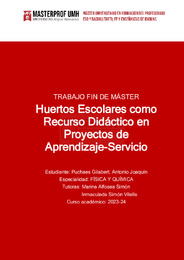Please use this identifier to cite or link to this item:
https://hdl.handle.net/11000/33036Huertos escolares como recurso didáctico en proyectos de aprendizaje-servicio
| Title: Huertos escolares como recurso didáctico en proyectos de aprendizaje-servicio |
| Authors: Puchaes Gilabert, Antonio Joaquín |
| Tutor: Alfosea Simón, Marina Simón Vilella, Inmaculada |
| Editor: Universidad Miguel Hernández de Elche |
| Department: Departamentos de la UMH::Física Aplicada |
| Issue Date: 2024-06 |
| URI: https://hdl.handle.net/11000/33036 |
| Abstract: El objetivo de este estudio es investigar los Huertos Escolares como Recurso Didáctico en proyectos de Aprendizaje Servicio. Se examina la evolución histórica de los huertos escolares, destacando su relevancia en la educación ambiental y la promoción del desarrollo sostenible. Se subraya la importancia de integrarlos en el currículo escolar para fomentar el trabajo colaborativo, el aprendizaje significativo y la conciencia ambiental. Los objetivos del estudio incluyen analizar el marco teórico del Aprendizaje Servicio y su aplicación en huertos escolares, realizar una revisión de la literatura académica, describir la metodología para implementar un proyecto de diseño de huerto escolar y evaluar su impacto en el desarrollo académico, personal y comunitario del alumnado. El método consistió en una revisión de la bibliografía y estudios recientes sobre la temática, seguida de la planificación y creación de un huerto escolar. Se desarrollaron estrategias para evaluar su impacto mediante el uso de una rúbrica que consideraba competencias clave, el desarrollo del huerto y su impacto en la comunidad. Los resultados mostraron que los huertos escolares son una herramienta educativa multifacética. Promueven el conocimiento académico en educación medioambiental y otras materias transversales como matemáticas, ciencia, tecnología e ingeniería. Además, incentivan una alimentación saludable desde edades tempranas y cultivan habilidades prácticas y valores cívicos. En conclusión, el estudio confirma que los huertos escolares son una herramienta pedagógica poderosa que facilita la comprensión de conceptos teóricos, a la vez que prepara al estudiantado para ser ciudadanos responsables y comprometidos con el desarrollo sostenible. The aim of this study is to investigate School Gardens as a Teaching Resource in Service-Learning projects. The historical evolution of school gardens is examined, highlighting their relevance in environmental education and the promotion of sustainable development. The importance of integrating them into the school curriculum is highlighted to promote collaborative work, meaningful learning and environmental awareness. The objectives of the study include analysing the theoretical framework of Service Learning and its application in school gardens, conducting a review of the academic literature, describing the methodology to implement a school garden design project and evaluating its impact on academic, personal and student community. The method consisted of a review of the literature and recent studies on the subject, followed by the planning and creation of a school garden. Strategies were developed to evaluate their impact through the use of a rubric that considered key competencies, the development of the garden, and its impact on the community. The results showed that school gardens are a multifaceted educational tool. They promote academic knowledge in environmental education and other transversal subjects such as mathematics, science, technology and engineering. In addition, they encourage healthy eating from an early age and cultivate practical skills and civic values. In conclusion, the study confirms that school gardens are a powerful pedagogical tool that facilitates the understanding of theoretical concepts, while preparing students to be responsible citizens committed to sustainable development. |
| Notes: Especialidad: Física y Química |
| Keywords/Subjects: Educación ambiental Metodologías activas Agricultura ecológica Desarrollo sostenible Impacto comunitario Alimentación saludable Obesidad infantil |
| Knowledge area: CDU: Ciencias sociales: Educación. Enseñanza. Formación. Tiempo libre |
| Type of document: info:eu-repo/semantics/masterThesis |
| Access rights: info:eu-repo/semantics/openAccess |
| Appears in Collections: TFM - M.U Formación del Profesorado ESO y Bachillerato, FP y Enseñanzas de Idiomas |
.png)

